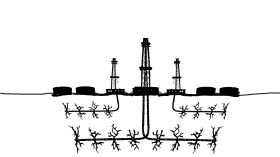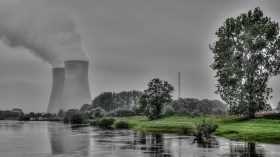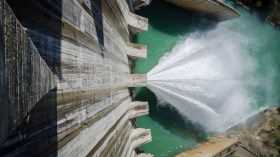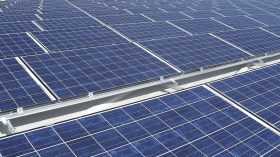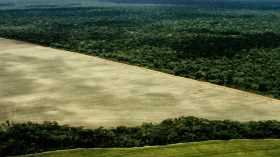
Source: Composite by G_marius based on a darthpedrius's image
We discuss the pros and cons of fracking and debate if the dangers of fracking offset its economic benefits.
What is "fracking"? History and evolution
Hydraulic fracturing (ʺfrackingʺ) is the fracturing of rock by a pressurized liquid. This technique consists on injecting water, sand and chemicals at high pressure in order to create small fractures and facilitate the extraction of gas and oil. Hydraulic fracturing can report important economic benefits to many countries but entails important environmental and public health risks.
The history of fracking can be traced back to 1862. During the American Civil War, Col. Edward Roberts realised that oil could be extracted through the use of explosives. In 1865, he created the patent of the "Exploding Torpedo." This method used an iron case with powder which exploded under the surface and propelled water, fracturing the subsoil and contributing to increase the production of gas and oil wells. Later, liquid nitroglycerin was used in the process, until, in the 1930s, drilling companies, replaced it by with a non-exploding liquid called acid.
The expansion hydraulic fracturing began in the 1940s following a successful experiment contucted by Floyd Farris for the Sanolind Oil and Gas Corporation in 1947. Floyd injected gelled gasoline (napalm) and sand in a gas producing formation at the Hugoton gas field in Kansas. A patent for this new method was issued in 1949. Halliburton Oil Well Cementing Company acquired the exclussive license and implemented the first commercial fracturing treatments in Archer County, Texas, and in Stephens County, Oklahoma. The USSR introduced fracking in 1952, and later other countries gradually adopted this technique.
In the late 1960s, a new technique called massive hydraulic fracturing (or high volume fracturing) was introduced in the USA. It consisted of injecting over 136 metric tonnes of proppant and help make economically viable the expoitation of gas saturated sandstones with low permeability. Massive fracturing became popular in Western Canada, Germany, Netherlands and the UK.
Fracking continued to grow and evolve. President Gerald Ford included the development of shale oil resources as a prioritiy in his energy plan. In 1976 the US Government lauched the Eastern Gas Shales Project and public funding was devoted to the Gas Research Institute, which undertook many experiments and projects in the following years. In the 1980s, oil companies realised that horizontal wells were more effective in producing oil than vertical ones. In 1997, Nick Steinsberger, an engineer from Mitchell Energy, discovered a more efficient slickwater fracturing technique. By applying higher pump pressure and more water, gas extraction became economically viable in the Barnett Shale in Texas.
Today, there are horizontal wells using massive hydraulic fracturing in the USA, Canada and China. Thanks to these latest techniques, shale gas extraction has become economically viable. However, some countries, such as France and Tunisia, aware of the environmental and health dangers of fracking have decided to ban it. But is the impact of fracking mostly positive or negative? Should governments continue promoting innovation in this area?
Fracking pros and cons
Defenders of hydraulic fracturing usually explain that this technique has some benefits:
- The main benefit is the impact on the economy. The technique allows companies to access oil and gas difficult to get by traditional drilling methods. Therefore it would contribute develop a new industry and the economy in areas where gas extraction was not possible before. It can also contribute to increase the offer of gas and oil, on which our economy is so dependent, keeping consumer prices down.
- Fracking is positive in terms of energy security as countries may become less dependent on oil and gas imports and avoid the impacts of fluctuation in oil prices.
- Fracking may have an indirect positive impact on environment. If you take into consideration that the technique is mostly used to extract natural gas, which produces far less carbon dioxide emissions than other commonly used sources of energy, such as coal.
On the flip side, criticism against fracking includes some of these arguments:
- Environmental risks are often cited as the main problems. Fracking is associated with air and water contamination in the production area. Some of the chemicals used in fracking, such as hydrochloric acid, can be very dangerous for the environment. More than 40 different chemicals are used in the proces, such as acids, bioacides, breakers, stabilizers, corrosion inhibitors, crosslinkers, gelling agents, and surfactants. Additionally, hydraulic fracturing is a very noisy activity, and it can cause small local earthquakes.
- In addition, hydraulic fracturing is criticized for wasting a considerable amount of fresh water, when drought risks are increasing. Clean water precious assets for life.
- The economic argument presented by defenders of fracking is also often criticized by opponents. Since oil and gas ressources are limited, using hydraulic fracturing is only delaying the inevitable end of fossil energy, and increasing the problem of climate change. Maybe efforts and investments should be dedicated to sustainable energies, such as the solar or hydroelectric energy, and not to alternative drilling techniques.
Watch these videos on the benefits and dangers of fracking
Emerging questions: Should fracking be used despite its environmental risks? Should fracking be banned? Should governments continue investing in research and innovation to make fracking less harmful for the environment?
If you change your mind, you can change your vote simply by clicking on another option.
New to netivist?
Join with confidence, netivist is completely advertisement free. You will not receive any promotional materials from third parties.
Join the debate
In order to join the debate you must be logged in.
Already have an account on netivist? Just login. New to netivist? Create your account for free.
You are viewing a filtered list of comments. Click the button above to view all comments.
Hydraulic fracturing has been used for over 60 years so it's hardly a mysterious development that needs a lot of explaining. What has 'changed' are the technology improvements and the replication of the process. It generally takes more wells to exploit an unconventional play that a conventional one but the industry keeps coming up with ideas to improve the processes (fitting more wells in a single site, better casing, less energy intensity, higher recovery factors etc). It certainly follows the principle of self-interest!
On the other hand, it is true that there have been a few genuine examples of groundwater contamination (by the by, most reported groundwater contamination attributed to fracking actually stemmed from existing biogenic material turning into methane, including that famous flaming tap in the Oscar-winning, agit-prop piece, Gasland) . However, even these isolated cases sound like peanuts when you compare it to the 1.1 million wells currently active in the US alone. Also a very important differentiation: in those cases where groundwater contamination could be traced back to oil and gas activities, this has been proven to be inherent, not to the fracking process itself or the chemicals therein, but poorly designed wells seeping into the aquifer. So essentially, by forcing companies to adopt good industry practices (and having oversight over the application), the risk becomes even lower.
No energy source is perfect but in spite of all the misinformation directed by interest groups, hydraulic fracturing has been a boon for the US economy and so far, has shown to have a manageable risk profile. With regards to the point made about infrastructure in this forum, that's simply not supported by the reality on the ground. Firstly, secondary infrastructure (e.g. access roads) are paid by the oil and gas operator. Second, the offset is tremendous on the positive side. In North Dakota (the highest economic growth of all US states for 3 years running, a growth based on a fracking boom), oil and gas taxes alone have financed 80% of the cost of public schools and allowed property and income tax reductions. Budget surpluses have been cleverly reinvested to attract other industries towards future declines in production.
Join the debate
In order to join the debate you must be logged in.
Already have an account on netivist? Just login. New to netivist? Create your account for free.







